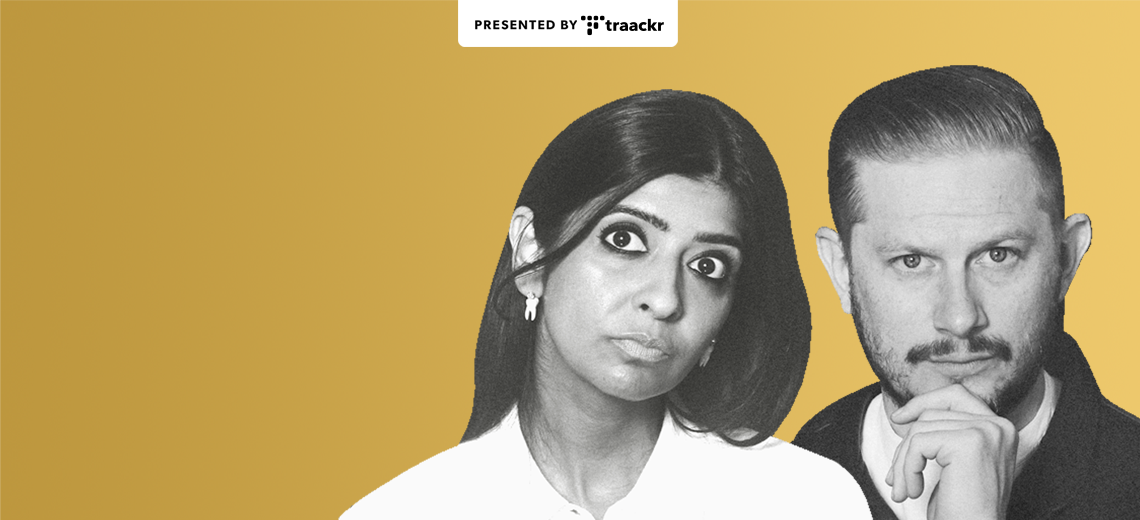This is an episode of the Glossy Beauty Podcast, which features candid conversations about how today’s trends are shaping the future of the beauty and wellness industries. More from the series →
The indie fragrance market has gained steam in recent years as newcomer perfume brands attempt to reinvigorate the industry. One brand that is getting it right is D.S. & Durga, founded by husband and wife David Seth and Kavi Moltz.
Like many small business owners at the time, the two founders launched their Brooklyn-based fragrance house nearly 14 years ago with their own funding. David Seth Moltz’s love for the arts paired with Kavi Moltz’s expertise in architecture helped create a brand that was different from anything on the market. Their unique approach to scents and packaging is still what separates D.S. & Durga from other competitors, but the two say, ultimately, their biggest goal is to spread joy through scents.
The founders got their start in luxury through a merchandising partnership with Barneys in 2016 and recently secured a deal to sell their products in Bergdorf’s in March. D.S. & Durga currently has two physical retail stores in New York — one in Nolita that opened in 2019 and one in Williamsburg — though there are plans to open more locations. As the company focuses on scaling this year, David Seth Moltz said those retail partnerships, and future ones, are crucial to building a strong foundation. The brand’s three main business pillars are wholesale sales, direct sales and the founder.
“You have to know people who know how to sell well in wholesale and how that whole system works. We have such a great sales team that does that for us,” he said.
In terms of the other two pillars, he said “direct” refers to speaking directly to your consumer in your stores and online. Under the founder pillar, both David Seth and Kavi Moltz are tasked with going out, building relationships, growing as leaders and collaborating with like-minded partners.
Below are additional highlights from the conversation, which have been lightly edited for clarity.
Ad position: web_incontent_pos1
Breaking into the perfume industry
Kavi Moltz: “[Perfume] was a very unknown and mysterious space. It still is. Breaking into the fragrance industry from the outside was basically impossible. No one’s looking to explain anything to you. It’s very European. It’s dominated by people who have trained in fragrance, so it’s hard to emulate another [brand]. A brand of our scale or our type didn’t exist that much [when we started]. I’m not saying it didn’t exist at all, but we were one of the first small-scale perfumers to do everything on our own. We knew [we had] something special there to start with. It wasn’t the most saturated market when we started nearly 14 years ago. It was different then. It’d be a lot harder today [to launch an indie fragrance brand]. Every facet of the beauty industry is more crowded today than it was 14 years ago.”
A unique approach to fragrance
David Seth Moltz: “I make a playlist for everything, and I make a whole document about every object, color, person, time of day and season that is this scent. If you’re going to make content based on something, and it’s [our] Burning Barbershop [scent, for example], you don’t want bright yellow during the summertime and people in bikinis because that wouldn’t make sense for what Burning Barbershop is. I always [make sure] I [include] a lot of details.”
Adjusting to a competitive market
David Seth Moltz: “We’re not trying to grow 2,000% by next year and [then sell our company]. We’re trying to build something sustainable that will be here for hundreds of years. [We want to] spread joy and tell rich narratives and show that perfume can live on the same level as other things.”
Kavi Moltz: “We have a healthy competitive nature. We surely feel like we have some of the best products out there, but we keep our heads down and look at our own paper. We’ve done slow and steady growth, and that’s just how we have to do it, because we’re all in this. David and I started this from basically nothing — just on our own, with no investment, years ago. Now, as things grow, we’re definitely interested in being competitive in the market, and we have people on our team who help with that.”




